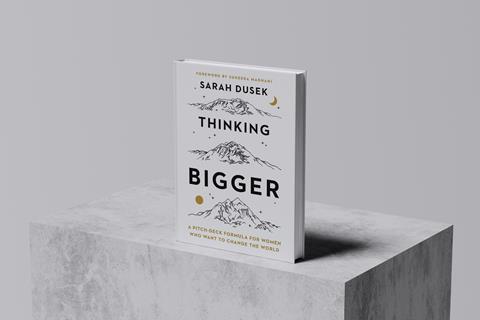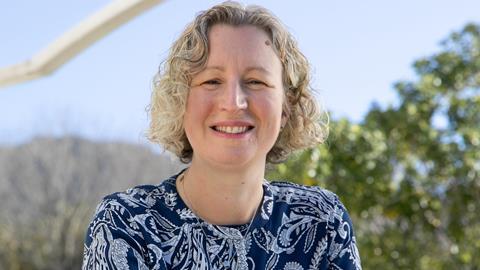Successful entrepreneur and venture capitalist investor, Sarah Dusek, reveals that business is not the ‘dark side’ that needs redeeming, as she once thought, but the very vehicle for growing God’s kingdom she had been looking for
“I used to think business was the dark side,” Sarah Dusek confesses. “Making money, in my mind, was evil. It represented everything that was wrong with the world.”
If you’d told 20-year-old Sarah that one day she would be the co-founder of numerous multi-million pound businesses and passionate about the possibilities and opportunities presented by venture capital, she probably would have laughed. “Not-for-profit agencies do good, and business is bad,” was Sarah’s youthful, binary perspective, which shaped her early career.
Following God’s call
“As a young person I had a strong yearning to make a difference, to solve big world problems.” Initially, Sarah thought this would be through law – “fighting the bad guys and fighting for justice” – but on completing a bachelor’s degree in law at the University of Exeter her focus shifted to the non-profit sector, specifically in Zimbabwe.
I had a very narrow view in my mind of what serving God looked like: you needed to be in full-time Christian mission, ideally overseas
This yearning to make a difference in people’s lives felt instinctual to Sarah. “It was born out of my faith,” she explains, “and a strong sense of calling.” Sarah became a Christian at 15 through a friend at school. “Ever since I was a little girl, I had spiritual instincts and a sense that there was something more, but this didn’t come out of my family heritage or background. Me becoming a Christian was a very unusual thing for them.”
Sarah’s parents, although very supportive, thought her decision to volunteer in Zimbabwe post-university a bizarre one. Rather than ending up in a solicitors’ office or training as a barrister, Sarah followed the yearnings she felt God had placed on her heart to a ramshackle classroom in Zimbabwe, teaching AIDs education programmes with Scripture Union. This was the start of eight years working overseas in Christian ministry, first with Scripture Union, then the Anglican Church in Hong Kong and finally for a Chinese organisation in Taiwan.
Driven by her instinct to action change and a desire to see souls saved, as time went on Sarah found her motivations unaltered but her spirit and body tiring. “As I poured myself out, I began to realise that human beings have limits. However much I wanted to change the world, I also needed to take care of myself. I was burned out.”
Could business represent the heart of God?
Sarah returned to the UK feeling disillusioned and lost: “I wanted to keep serving God – driving change and solving big world problems – but I couldn’t keep living the way I was living.” Newly married to Jacob (from Montana, North America), whom she’d met while working in Taiwan, Sarah was not alone in this sense of distress: “We both felt like we were missing something. We felt like we were continually pouring ourselves out but not actually solving anything. Yes, lives were being changed, and this we celebrated, but we continually felt that we weren’t making a big enough impact.”
This sense of there being something else, or another way of actualising change that they were yet to tap in to, combined with a prompt from the vicar at the church they were attending in Winchester, led to Sarah signing up to a master’s degree in missiology at Cliff College through the University of Manchester. What crystallised for Sarah during her studies was an appreciation of the multi-faceted nature of mission; the depth and breadth of God’s mission and the many ways in which this can be lived out.
“I had a very narrow view in my mind of what serving God looked like: you needed to be in full-time Christian mission, ideally overseas. That was the only way to be fully committed and wholehearted.” But during her course this perspective was challenged, so much so that Sarah began a deep dive into the merits of the business world – the ‘dark side’ as she’d once thought. “Studying really started to shift and shape my thinking as I wrestled with the idea that business could be used as a vehicle for good.” Sarah concluded that business had the potential to solve big world problems beyond simply donating profits and in a way she personally had not witnessed or experienced in the not-for-profit world. “Businesses exist to solve very specific problems; successful businesses solve big problems that affect millions of people.” Sarah became increasingly confident that if a business was envisioned and executed with a desire to drive positive change, it had the potential for significant impact.
This understanding came hand in hand with a shift in her theology, away from a sole focus on the mission of God being to save lives, to a more holistic understanding summarised in the image of God’s kingdom coming on earth. Business could represent the heart of God, and business could be a way of ushering in God’s kingdom on earth. Sarah experienced her sense of calling evolve: “The heart of the calling God had placed on my heart as a student didn’t change, but the expression of it did.”
Kingdom-minded business
Sarah’s epiphany that business was the expression of her calling took years to work out in practice. The first social business Sarah and Jacob established in the UK ultimately failed in the financial crash of 2007-2008. It took perseverance, commitment and realism about needing an income – with a growing family following the birth of their first child – to pick themselves up and try again. Moving to Jacob’s home state of Montana, the couple embarked on their next business venture, a tented hotel that would later become the thriving travel company, Under Canvas.
It was tenacity, gumption, risk taking and slowly learning the rules of business and the necessity of venture capital that eventually saw Under Canvas thrive. “Driving profit is essential,” Sarah explains, a concept that would have felt controversial to her former self. “If a business doesn’t make money, then it won’t last very long. Profit is an essential component to a business.”
But for Sarah, profit is only one leg of a three-legged stool for a thriving, kingdom-focused business. “We need to build businesses that do right by people, planet and profit,” she explains. “When establishing Under Canvas we needed to think about how we could solve problems for people and planet through our business; how we could bring God’s kingdom to earth through what we were creating.”
Over the next ten years of growing the business, Sarah and Jacob made numerous kingdom-motivated choices that their business-minded counterparts told them would fail. “At the time, it wasn’t believed possible to build a hotel that didn’t consume vast amounts of the world’s resources. But we aimed for an ecologically sound, minimal footprint product.” The result was multiple thriving, sustainable, canvas hotels outside of national parks across America, which used only a tenth of the water a traditional hotel of similar size used, and renewable energy wherever possible; enabling people to be in the heart of God’s creation without wrecking it.
Sarah also felt passionate that people shouldn’t be excluded from such an experience simply because they couldn’t afford it. “Rest and recreation are fundamental components to being fully alive – the Sabbath principle. I announced to my team that we were going to give away vacations on a pay-what-you-can basis. The response was, ‘you’ll go bust’.” The first year Sarah initiated this, they gave away over 1,000 holidays and still turned over plenty of profit.
These kingdom-centred business choices filter down through everything, including how employees are treated, engaged, supported and empowered. “We wanted to bring a different essence into everything that we were doing, driving change through every choice.”

Empowering women
Sarah acknowledges that profitable businesses inevitably yield power, and feels passionately that more individuals are needed at the table who will use this power for good; in particular, women. “Traditionally, women are known to be impact oriented, heart driven and socially conscious. We need both genders at the table, solving the problems that we see very specifically through our own lenses and driving change. Currently women are severely underrepresented in this sphere, and when 50 per cent of us are left behind the world is poorer for it.”
Sarah has been on her own journey of discovering what she’s capable of, “chasing big, crazy dreams and making them happen,” as she puts it. Despite the setbacks, a lack of mentoring and information available to her as a woman, and with some unhelpful messages she absorbed on her Christian journey echoing in her head, she has persevered.
Twenty years on from beginning her journey in business, Sarah now invests in female entrepreneurs across the African continent through Enygma Ventures, alongside continuing to pursue her own entrepreneurial dreams of bringing God’s kingdom to earth through business – the latest being a new eco-travel company, Few and Far. She has also recently published a book, Thinking Bigger: A pitch-deck formula for women who want to change the world (Georgetown University Press). “I want to share what I’ve learned to help equip and empower more women with a heart to drive change thrive in the business world.”
Sarah wants each of us to be assured that: “you can enable the change you want to see in the world”, and that this can happen through successful businesses. sarahhdusek.com
Words by Jane Knoop




























No comments yet